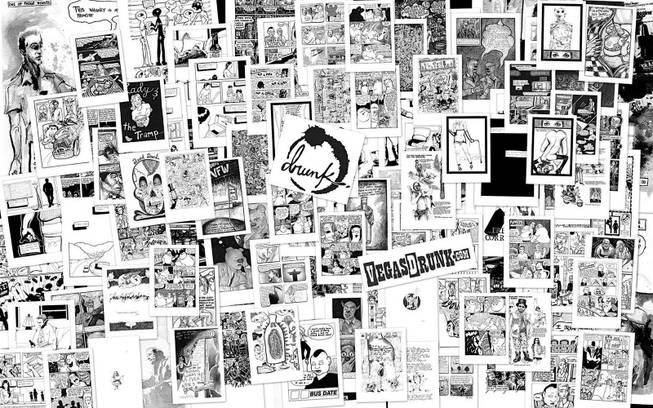
Courtesy photo
Work of 24 artists is featured in “Drunk,” a project of three Las Vegas friends that is about alcohol’s effect on culture, for better and worse.
Monday, July 6, 2009 | 2 a.m.
About the Book
- What: “Drunk,” self-published, 128 pages
- Pre-order: $25, vegasdrunk.com
- Artists: Jay Bailey, Chris Bauder, Ivan Brunetti, Chad Brown, Mark Burns, Kim Deitch, Evan Dent, Daryl Depry, Noelle Garcia, Brian Hockersmith, Sue Kay Lee, Laurenn McCubbin, Tori Morris, Michael Ogilvie, Jim Pink, Ivera Pennant, Norman F. Pettingill, “Q” Patrick Quilao, Sean Russell, Michael Sarich, Aaron Sheppard, Rachel Sparrow, Erin Stellmon, F. Andrew Taylor, Michael Todoran, foreword by Jarret Keene
- Also: The book will be released in September and featured at the Vegas Valley Book Festival, Nov. 4-8, www.artslasvegas.org/vvbf/
Sun Archives
- Comic book literature unmasked at festival (11-6-2008)
- Vegas Valley Book Festival #7 still on the books (5-29-2008)
- Bookstores aren’t our thing, but Vegas has literary life (2-27-2008)
Beyond the Sun
Bar stories are notoriously exaggerated, somewhat rambling and occasionally nonsensical. The best are amusing. The worst are depressing.
“Drunk,” a new 128-page graphic novel, offers illustrated tales of the tragedy and hilarity that live in the world of alcohol.
The limited-edition, hardcover book is a project by Las Vegas residents Michael Ogilvie, Sean Russell and Michael Todoran.
Much like a drunk, the book is vulgar, dark, funny, charming and surprisingly sensitive.
Several stories take place in Vegas watering holes.
Ogilvie and friends came up with the idea six years ago after a comics convention where a similar collaboration had taken place. Given all the bars and artists in the area, they figured they had a ringer, but it wasn’t until a year ago when they started gathering stories, most of which are by Las Vegas artists and incorporate inside Vegas humor, which you don’t have to be in on to understand the stories.
Guest national artists include Ivan Brunetti, Kim Deitch and the late Norman F. Pettingill, whose storied bar scenes were provided by the John Michael Kohler Arts Center. R. Crumb was asked, but said he didn’t have the time.
Ogilvie says the book is not a glorification of drinking, but rather a document in comic form of alcohol’s effect on culture — for better and worse.
The forward, written by Jarret Keene, includes tips on what he’s learned from his work as a bar critic, a position “you work your way down to.” Along with meeting at bars, making friends, scanning the bar for threats and establishing boundaries, he suggests “staying late.”
“Until you’ve ordered trout and eggs for your fellow karaoke enthusiasts (homeless and toothless as some may be) at noon the following day ... you have not lived,” Keene writes. “In fact, you have not even been born.”
That sets off the series of stories told in black and white: A washed-up Las Vegas lounge singer finds an innovative way to get free drinks, a man tries to combat loneliness with beer and a phone sex operator, aliens partake in hypersexualized dating rituals, and senseless brawls break out.
The work of 24 artists is featured, including comics by a handful of women. Noelle Garcia portrays a family — her family — struggling with the abuse of her alcoholic father. She doesn’t drink much, she says, because as a Native American she’s seen devastating effects of alcohol.
Chad Brown expresses his boredom with local bars and frustration with Las Vegas culture. “This is one of the most selfish places I’ve even seen,” Brown says. “The level of consumption and inconsideration of one another just breaks my heart.”
Mark Burns, a ceramics professor at UNLV, lampoons Dave Hickey and the art department.
Ogilvie, who has two earlier comic books on his resume, loosely portrays conflict and resolution one night at Champagnes.
For all the craziness unleashed on the pages, the book provides a well-rounded, compelling story of a traditional pasttime.
The self-published book, being released in September, is privately funded by Ogilvie, Russell and Todoran from a sponsorship from Moss, the one-named owner of the Double Down Saloon.
“We really didn’t have any money to pay anybody,” Ogilvie says. “It was more, ‘If you want to do this, we’d like you to do this.’ ”
Surprisingly, they obliged.
“Comics have for years been a refuge for children,” Ogilvie says. “Revisiting comics as an adult can link one to a memory or time of innocence, a time before love and joy were terminal.”

Join the Discussion:
Check this out for a full explanation of our conversion to the LiveFyre commenting system and instructions on how to sign up for an account.
Full comments policy